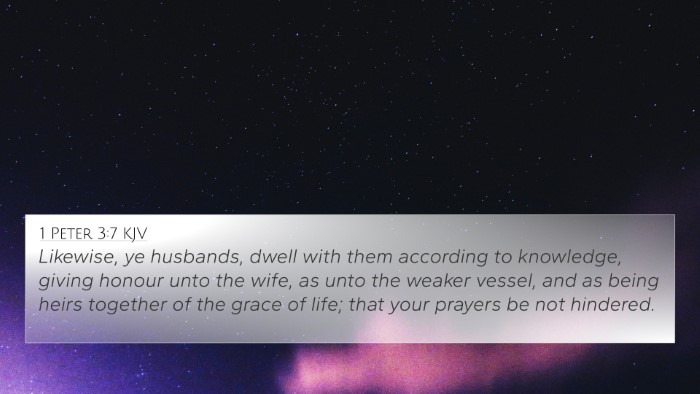Understanding 1 Corinthians 7:3
Verse: 1 Corinthians 7:3 - "Let the husband render unto the wife due benevolence: and likewise also the wife unto the husband."
This verse serves as an essential guideline for marital relations, emphasizing mutual respect and fulfillment of sexual obligations. It highlights the importance of love and service within the marital framework.
Commentary Insights
Drawing from the insights of Matthew Henry, Albert Barnes, and Adam Clarke, this verse can be seen as setting a foundational principle for relationships within marriage:
- Mutual Responsibility: Henry notes that both partners hold equal responsibility in giving and receiving affection. He emphasizes that the duty of a husband towards his wife and vice versa is rooted in love and commitment.
- Against Selfishness: Barnes reflects on the need to counteract selfishness in marriage. Each partner is urged to prioritize the needs of the other, fostering a harmonious relationship that repudiates self-centeredness.
- Nature of Benevolence: Clarke elaborates on the concept of "benevolence" as not just physical but also emotional and spiritual support, suggesting a holistic view of marital obligations.
- Divine Order: The verse reflects the divine order established for marriage, where the mutual giving of affection aligns with God’s design for marital unity.
- Spiritual Implications: The loving engagement discussed here aligns with the broader biblical theme of love, which resonates throughout scripture as a commandment to not only build up each other but also reflect Christ's love.
Bible Verse Cross-References
This verse can be cross-referenced with several other biblical texts that elucidate themes of love, obligation, and mutual respect in marriage:
- Ephesians 5:25-28: This passage calls husbands to love their wives as Christ loves the church.
- Colossians 3:19: Paul instructs husbands to love their wives and not be harsh with them.
- 1 Peter 3:7: Emphasizes understanding and honor among partners, recognizing the equality of the spouse.
- Hebrews 13:4: Highlights the importance of marriage, stating that it must be honored by all.
- Genesis 2:24: Establishes the principle of a husband and wife becoming one flesh, reflecting unity and mutual support.
- Malachi 2:14-15: Discusses God's covenant of marriage and the expectations therein, advocating for fidelity and love.
- Proverbs 5:18-19: Encourages rejoicing in one's spouse, celebrating the joy and satisfaction of marital love.
Thematic Bible Verse Connections
Different Bible verses often relate to one another, fostering a deeper understanding of God's expectations for marital relationships:
- Benevolence is a recurring theme, illustrating the need for sacrifice and commitment to one another.
- The covenant aspect mirrors the divine fidelity God exhibits towards His people, reflecting in our own relationships.
- Encouragement of love as a fundamental principle resonates throughout scripture, being a command to believers.
Cross-Referencing Bible Study Methods
For those looking to explore the connections between verses, various tools and methods can enhance your study:
- Bible Concordance: A valuable resource for identifying where specific themes or words appear throughout the Bible.
- Bible Cross-Reference Guide: Helps in tracing thematic links across both the Old and New Testaments.
- Cross-Referencing Bible Study: Engaging in systematic study of related texts can reveal deeper insights into God's word.
- Bible Chain References: Following a chain of related verses can enrich understanding through inter-Biblical dialogue.
Conclusion
1 Corinthians 7:3 calls both husbands and wives to a posture of love and giving within the marriage relationship. By understanding and applying the insights from biblical commentaries and cross-referencing related verses, believers can cultivate a marriage reflective of God's love and design.
Engaging in this study with a heart intent on understanding will surely deepen one's faith and appreciation for the sacred bond of marriage.




